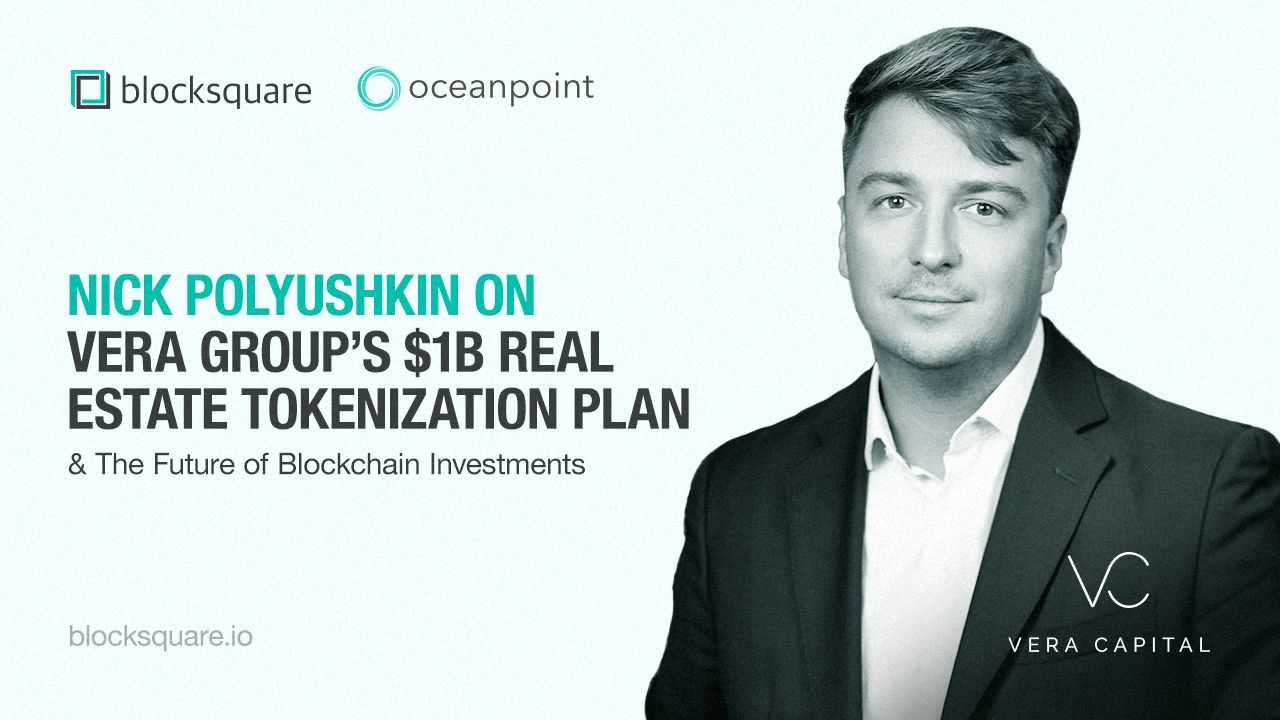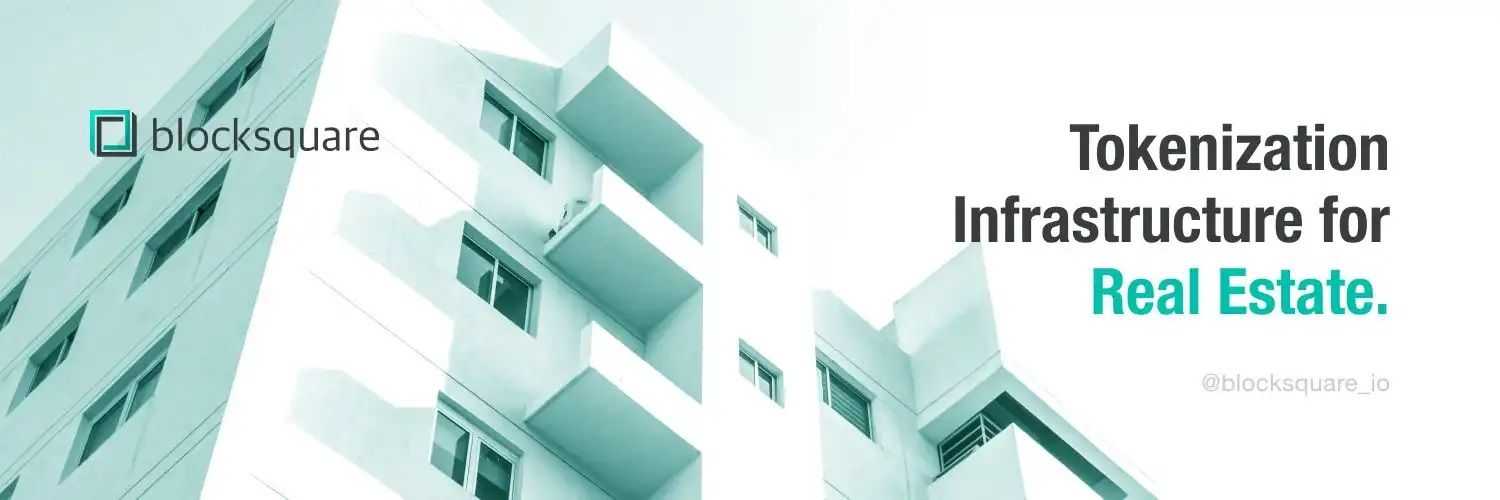Vera Group's $1 Billion Real Estate Tokenizaton Plan
Let’s face it—real estate investing has always been out of reach for most people. The process is slow, expensive, and locked behind mountains of paperwork and red tape. But what if it didn’t have to be? In the latest episode of BLOCK-CHAT, Blocksquare CEO Denis Petrovcic sits down with Nick Polyushkin, a real estate powerhouse who's been building Vera Group since 2012. With over $100 million in assets under management and a team of 100+ agents, Nick isn’t just talking about real estate—he’s living it, breathing it, and now… tokenizing it.


Blocksquare and Vera Group Partner to Tokenize $1 Billion in Real-World Assets in the US
That’s right. Vera Group is stepping into the Web3 world in a big way with the launch of Vera Capital, their blockchain-powered investment platform designed to break down the barriers to commercial real estate ownership. We're talking about a company with a $1 billion development pipeline and a strategy to make high-value real estate accessible to everyday investors—all powered by tokenization and blockchain.
In our conversation, Nick shares why now is the perfect time to bring real estate on-chain, how Vera Group is preparing to roll out its first tokenized property in Fort Lauderdale, and what’s fueling this massive shift in investor behavior. We also get into the U.S. regulatory landscape, why tokenization solves real pain points in real estate, and how Vera Capital’s partnership with Blocksquare and Oceanpoint is setting the stage for something game-changing. If you’ve been curious about how real estate tokenization actually works—or why the smartest investors are paying attention—this is a conversation you don’t want to miss.
Let’s dive in.
The $1 Billion Vision: A Conversation with Nick Polyushkin on Real Estate Tokenization and the Future of Vera Capital
Denis Petrovcic: Nick, welcome to BLOCK-CHAT. We’ve been in discussions about this launch for a while, and it’s exciting to finally see it come together. Tell us, when did your journey with Blocksquare begin?
Nick Polyushkin: Thanks for having me, Denis. I first came across Blocksquare last fall, after watching one of your YouTube videos. I was deep into researching real-world assets and exploring how tokenization could align with our growth strategy. After reaching out, our discussions started around October 2024. Since then, it’s been full speed ahead toward preparing for this launch.
The Foundation of Vera Group
Denis: For those unfamiliar with Vera Group, can you share how it started and what it’s grown into today?
Nick: Vera Group began in 2012 with Vera Realty, our brokerage firm. It was our entry point into the real estate industry. Today, Vera Realty operates across seven states and has over 100 licensed agents. We’re also a premier partner of Zillow, covering many zip codes where we’re active.
From there, we expanded into Vera Fund, which serves as our private investment vehicle. It focuses on acquiring commercial assets—retail plazas, office buildings, and also multifamily developments. Currently, Vera Fund oversees over $100 million in properties and about $20 million in development projects.
Then we added Vera Manager, our property management arm, which employs more than 20 people. They ensure our assets are well-maintained and attractive to tenants.
Vera Finder is our internal tech platform—it filters market opportunities based on specific investment criteria like cap rate and income potential. Then there’s Polyus Consulting, which handles our tax strategy, bookkeeping, and analytics. That’s essential in the U.S. where depreciation and 1031 exchanges are powerful tax tools.
All of this forms a full-stack real estate ecosystem—acquisition, management, analysis, and now, with Blocksquare, tokenization.
Why Tokenization, Why Now?
Denis: What inspired you to take Vera Group into tokenization?
Nick: Liquidity is the biggest issue in commercial real estate. The process of buying and selling properties is capital-heavy and time-consuming. If you’re not already well-connected in the industry, it's nearly impossible to break in.
Tokenization simplifies this by allowing fractional ownership of high-value assets. For example, if someone has $50K or even $1M—they typically can’t afford to buy and manage a commercial building on their own. But with tokenization, they can own a share of it and earn passive income without the operational burden.
It’s a way to open the doors for a new generation of investors. And it fits how younger investors think—they want easier, faster, digital-first ways to invest.
The $1 Billion Tokenization Pipeline
Denis: Let’s talk about that $1B figure. It’s bold. Where does it come from?
Nick: It’s very real. We looked at the developments and acquisitions already in our pipeline—if we were to build them all, we’d need upwards of $1 billion in capital.
To name a few: we’re planning a 132-unit multifamily project that will cost around $70–90 million. Another larger 250-unit project will surpass $100 million.
In addition, we continue to acquire stabilized assets that generate rental income. These are perfect for tokenization—there’s already revenue, a proven location, and future upside through development or resale.
So this isn’t some speculative future plan. These are tangible projects we’re already executing. Tokenization is simply how we intend to finance and scale it further.
Launching the First Tokenized Property
Denis: Can you give us the details on your first tokenized asset?
Nick: Absolutely. The first project is a 20,000 sq ft commercial building located on Oakland Park Boulevard in Fort Lauderdale—just ten minutes from the beach.
It’s a stabilized property, producing a 5% annual return, with long-term tenants already in place. But there’s more. The area is undergoing a transformation—new developments are rising next door and down the street.
The site sits on one acre, meaning there’s room to redevelop in the future. In fact, the property could support 82 multifamily units if redeveloped.
So, it’s not just a passive income opportunity—it has a clear value-add and exit strategy within the next two years. That’s what makes it ideal for our launch.
The US Regulatory Landscape
Denis: What’s your view on regulation in the U.S. when it comes to tokenization and crypto?
Nick: Things are moving quickly. Just recently, the U.S. government approved a Bitcoin reserve, which would’ve been unthinkable a year ago. We’re also seeing rapid movement toward integrating stablecoins into traditional banking.
The SEC has been dropping cases, and there’s more openness overall. I think over the next four years, especially under the current administration, RWA tokenization will become mainstream.
There are already U.S.-based companies that have raised $50 billion+ into commercial real estate tokenization. The trend is clear—and accelerating.
Why Blocksquare & Oceanpoint
Denis: Why did you choose Blocksquare as your technology partner?
Nick: I’ve followed Blocksquare for a while and saw firsthand how committed your team is. The infrastructure you’ve built is tailor-made for real estate tokenization, and you already have a strong community and reputation in the space.
The Oceanpoint.fi launchpad is a game-changer—it allows us to engage a wider audience and secure community support through $BST staking. We’ve personally pledged 27,000 staked BST as collateral to show our belief in the project.
Working with Blocksquare lets us focus on real estate while relying on your expertise in tokenization tech and compliance.
What’s Next for Vera Capital
Denis: What comes after this first tokenized property?
Nick: We’re launching our Oceanpoint marketplace pool campaign next week to raise $100K in pledged support. That will unlock the infrastructure for ongoing tokenization.
Beyond that, we plan to tokenize more stabilized assets, then bring in our development projects as the market grows. Ultimately, we want Vera Capital to become a leading marketplace for tokenized U.S. real estate, offering global investors access to high-performing commercial deals.
Denis Petrovcic: Nick, thank you for joining. It’s been a fascinating look at what’s possible when deep real estate expertise meets cutting-edge blockchain tech. We’re excited for the Vera Capital launch and the future ahead.
Nick Polyushkin: Thanks, Denis. Let’s build it—together with the community.
Learn more and participate in Vera Capital’s Launchpad campaign at app.oceanpoint.fi Follow Vera Capital’s launchpad forum.
